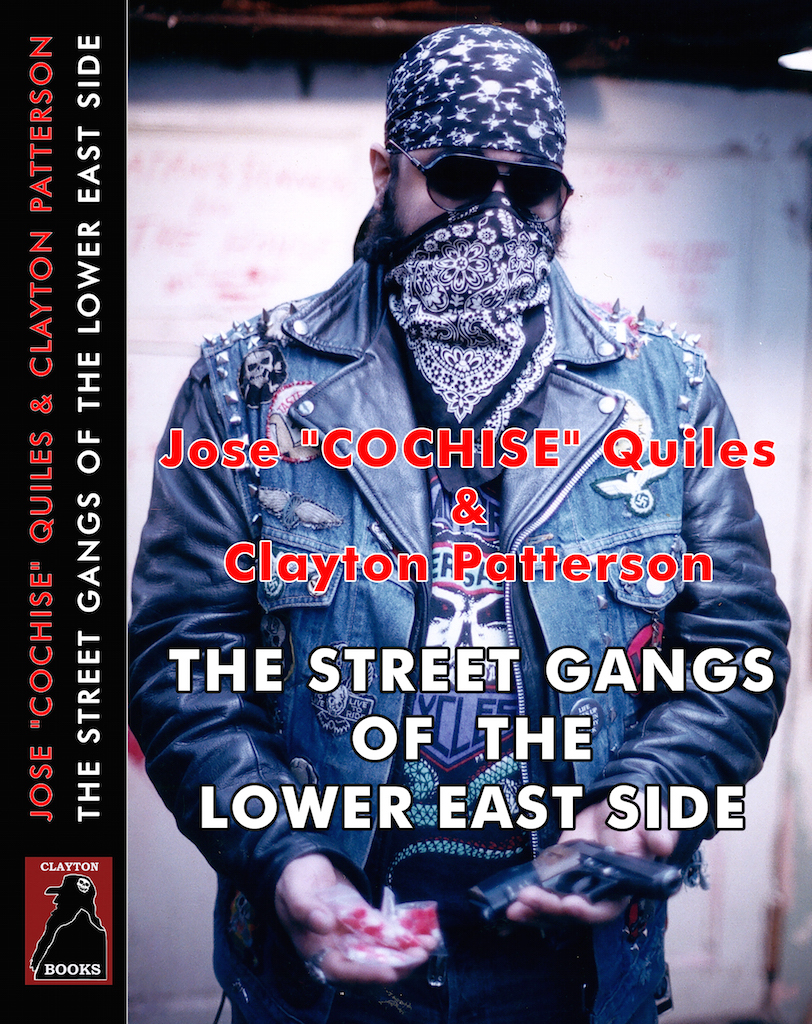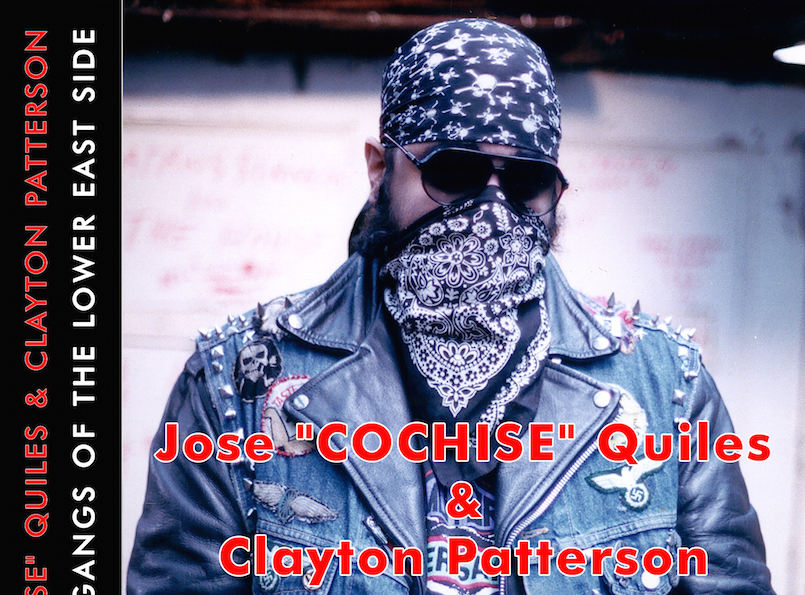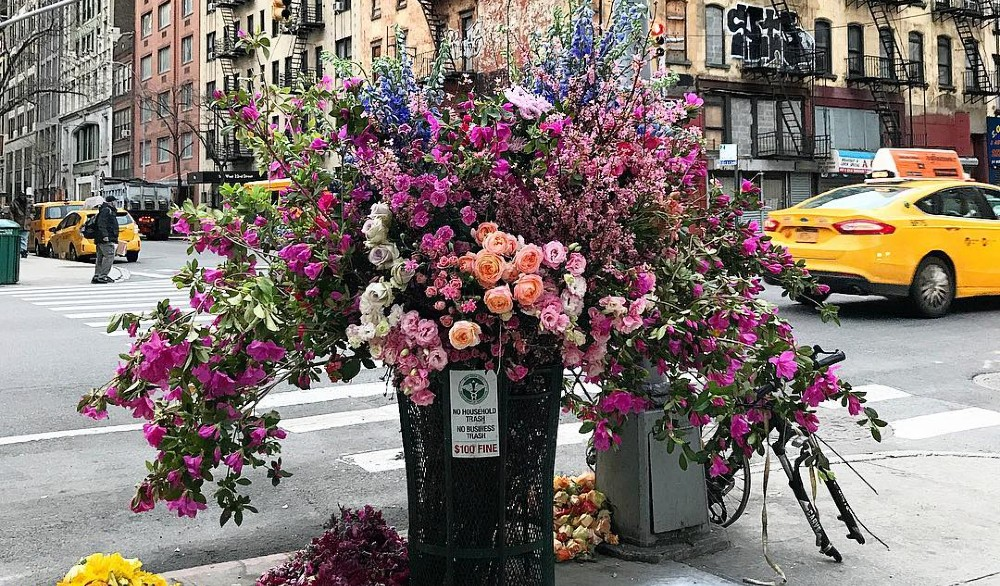
BY LINCOLN ANDERSON | L.E.S. documentarian Clayton Patterson is ready to rumble after his local independent bookstore declined to sell a new street-tough tome he co-authored with the former leader of the notorious Satan’s Sinner Nomads gang.
Photographer Patterson teamed up with Jose “Cochise” Quiles on the book, “The Street Gangs of the Lower East Side” (Clayton Books).
The book tells the story of Quiles, or as the back-cover copy reads, “one badass gangbanger’s struggle to break the cycle of violence and poverty since birth through creativity and compassion for others.”
The Satan’s Sinner Nomads were the last L.E.S. gang to wear colors — displaying the gang’s name on the back of their leather and jean jackets. Quiles went on to do 24 years in prison — including an 18-year stint for attempted murder — recently emerging from jail with a newfound artistic ability and an urge to teach a positive message to local youth, “to concentrate on poetry not thuggery.”
But Patterson said this Monday he got the brushoff from Bluestockings at 172 Allen St., when he walked the three blocks from his home on Essex St. to find out if they would sell the book. Opened in 1999, Bluestockings is an all-volunteer, collectively owned feminist and radical bookstore and self-described activist center.
“Imagine, Blue Stockings bookstore will not sell the book,” Patterson fumed. “When I went to pick up the copy I left, I asked the person what street he is on. He said Allen. This is the street the Allen Boys came from. Look out this store’s window, see the project across the street — some old Allen Boys still live there. One block over is Forsyth St., which the Forsyth Boys ran. Not to forget, in the community there are still Bloods, Crips, Latin Kings, Latin King Bad Boys and crews and posses.
“Is it because the book is an L.E.S. Hispanic history that Blue Stockings will not carry it?” he asked accusingly. “Anyway, they have no respect for where they are or the history of the area.”
However, Maria Herron, the consignment titles coordinator at Bluestockings, said the gangs book — at least at first glance — did not mesh with the store’s general focus.
(The store also has another buyer who focuses on titles from traditional publishers, as opposed to authors and small presses, like Clayton Books.)
Actually, she had told that in an e-mail to Patterson on Sunday, the day before he picked up his review copy.
“I looked over the review copy…and we are going to hold off for now,” she wrote him, adding, “Did you try Mast Books or McNally-Jackson?”
“I will be by. tx,” Patterson curtly responded.
After getting rejected, rather than just “turn the page,” Patterson posted an angry statement on Facebook, which someone from the ABC No Rio arts collective brought to Herron’s attention. Herron — saying she was shocked by the level of Patterson’s anger over the snub — wrote a response to that person, and, in turn, shared the e-mail with The Villager.
“The title was left at Bluestockings for consignment review and I was the one who declined it,” Herron wrote. “The book was presented as a history of gangs and gang violence in the Lower East Side. While we carry titles on many different topics, we generally curate the different sections through a lens of intersectional feminism, to which this title did not seem related, as it seemed like a book only on the history of violence of our neighborhood. Also, our consignment roster is pretty full.
“The store receives between four to 10 books every week for consignment review. We generally only say yes to books that make the most sense to carry at Bluestockings.”
Herron added that when Patterson picked up his review copy on Monday, it was “not without getting into a verbal altercation with the volunteer staffing at the time.”
However, Patterson denied that, saying, “I did not get into an argument. I took the book and I left.”
Herron said she personally did not appreciate Patterson posting on Facebook, in “a polemic full of accusations against us,” that the store did not want to carry the book because it concerned L.E.S. Latino history.
“As a Cuban-American woman of color myself, this was of course saddening to me,” she said, adding, “I also try and work with authors that can demonstrate that they are able to interact with me in a safe and professional manner.”
That said, she added, “I actually spent some time with a friend last night who was able to fill me in on Clayton and his contributions to the L.E.S., so I can understand, though, why he may have felt hurt.”
Herron added that they haven’t necessarily “closed the book” on the matter, either.
“This is not like a hard ‘no’ to his book,” she told The Villager. “Again, if he wanted to have a conversation about it, and was willing to do so in a calm and safe manner, there is always space for one to reconsider, if he really wants us to carry it.”
For his part, Patterson sees the book’s rejection as merely another chapter in the hood’s gentrification.
“Maybe I shouldn’t be, but I am still shocked by where the yuppie gentrifiers’ attitude comes from,” he said. “The part of the L.E.S. I live in used to be one of the most overlooked, forgotten parts. First night Elsa and I moved into our space, looking out the window, we saw a guy get shot and killed right across the street in front of P.S. 20. We had 24-hour drug sales outside our front door. The streets were controlled by drug crews, posses and gangs like the Allen Boys.
“In jail, Cochise turned his life around and now works counseling young gangbangers about the problems of being in a gang,” Patterson said. “He was always interested in L.E.S. street gang history. In jail he talked to many old L.E.S. gangsters and wrote down the information, which he turned into a book.
“The people who now have moved to the neighborhood have no interest in the actual past,” Patterson bitterly complained, “only a commoditized representation of the past.”


















